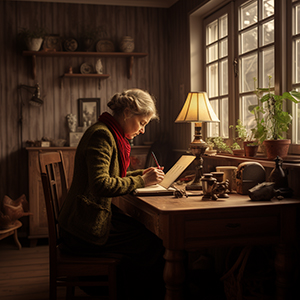Lesson 22 German
Clothes

Dear students, Dear caregivers of seniors
I am happy to welcome you again to our next lesson! We have already reached lesson number 22, and I am really impressed with your progress and commitment.
I recently had the pleasure of participating in a webinar on 24-hour home care for seniors. This meeting, with experts from both Poland and Germany, made me realize the importance of cultural sensitivity in elderly care. It reminded me of the value of understanding and respecting cultural differences in our work.
German for caregivers, lesson 1
German vocabulary for caregivers
In today’s lesson, we will focus on vocabulary related to clothing — a key aspect of senior care. Learning these words will help you with everyday communication and understanding the needs of your residents.
Here are the 10 clothing-related words we will learn today:
- Shirt — Das Hemd
- Pants — Die Hose
- Sweater — Der Pullover
- Coat — Der Mantel
- Hat — Der Hut
- Socks — Die Socken
- Shoes — Die Schuhe
- Dress — Das Kleid
- Gloves — Die Handschuhe
- Scarf — Der Schal
I hope these words become a useful tool in your daily work as caregivers. Every word you learn brings you closer to a deeper understanding of seniors and increases your career prospects.
Sample dialogues – everyday phrases and expressions
Dialogue 1: Choosing Clothes for the Day (Auswahl der Kleidung für den Tag).
Ewa: Welche Kleidung sollten wir heute für Sie wählen, Herr Martin? (What clothes should we choose for you today, Mr. Martin?)
Martin: Ich denke, ein bequemes Hemd und meine Lieblingshose wären großartig. (I think a comfortable shirt and my favorite pants would be great.)
Dialogue 2: A washing of clothes( eine Wäsche von Kleidung)
Ewa: Heute werde ich Ihre Wäsche waschen. Haben Sie einen besonderen Wunsch? (Today I will wash your clothes. Do you have a special request?)
Martin: Bitte pass auf meinen Wollpullover auf, er ist sehr empfindlich. (Please be careful with my wool sweater, it is very delicate.)
Interactive exercises: Reinforcing language skills
Task 1: Creating Scenarios
Goal: To use clothing vocabulary in realistic elderly care scenarios.
Task Description: Imagine that you are a caregiver for an elderly person in Germany. Your charge, Mr. Müller, is preparing to go out for a walk. Your task is to help him choose appropriate clothes, considering the weather and his preferences. Use the words from today’s lesson to describe what clothes you decide and why. Then, translate your answer into German.
Example: Mr. Müller, it’s chilly today, so I suggest wearing a warm sweater (der Pullover) and a coat (der Mantel). Let’s not forget the scarf (der Schal) and gloves (die Handschuhe).
Task 2: Dialogue with the Mentee
Goal: To develop communication skills in the context of elderly care.
Task Description: Create a short dialogue between you (as a caregiver) and the elderly person you are caring for about clothes. The dialogue should include a choice of clothes for today, considering the needs and preferences of your client. Use the vocabulary from the lesson to make the dialogue as realistic as possible.
Example:
- Eve (Betreuer): Guten Morgen, Frau Schmidt. Möchten Sie heute das blaue Kleid oder die bequeme Hose tragen? (Good morning, Mrs. Schmidt. Would you like to put on the blue dress or the comfortable pants today?)
- Frau Schmidt: Ich denke, die Hose wäre besser und bitte, einen warmen Pullover dazu. (I think the pants will be better and please a blue warm sweater).
Tips
Remember that as an elderly caregiver, your job is not only to take care of the physical needs of your charges, but also their comfort and well-being. These exercises will help you better understand and meet their needs, as well as develop your German language skills, which are invaluable for caregiver work in Germany. Use the Hrily platform — an online German language course to continue learning and strengthening your skills. Good luck!
Interesting country and customs about Germany
As caregivers of the elderly, working in Germany, you not only fulfill an important role in the lives of seniors, but also have a unique opportunity to discover the rich culture and history of the country. Today I would like to share with you an interesting fact from one of the German cities – Frankfurt am Main.
Frankfurt is not only one of Europe’s most significant financial centers, but also a city where culture and history merge with modernity. One of the most fascinating events to visit is Museumuferfest – the Festival on the Bank of Museums. It is usually held on the last weekend of August and attracts thousands of visitors. A cultural arcade stretches for several kilometers along the Men River, where you can visit museums, attend art workshops and enjoy outdoor concerts.
For an elderly caregiver, working in Frankfurt during the period of this festival can be not only an opportunity to gain valuable work experience, but also a way to spend your spare time exploring Germany’s cultural riches. You may even be able to take your charges for a walk along the Main, enjoying the atmosphere of the festival. This is a great opportunity to combine your job with your passion for traveling and discovering new places.
Summary of Lesson 22: Household Activities

Congratulations on completing Lesson 22 of our German for Caregivers course, focused on the topic of clothing. Your progress and commitment are impressive, and today’s lesson has undoubtedly enriched your language skills and cultural knowledge.
In this lesson, we focused on vocabulary related to clothing, a key aspect of senior care. The words presented, such as Das Hemd (shirt), Die Hose (pants) and Der Pullover (sweater), will certainly make it easier for you to communicate with your residents daily. In addition, sample dialogues, such as Choosing Clothes for the Day and Washing Clothes, have helped you put the newly learned vocabulary into practice.
Interactive exercises, including creating scenarios and dialogues with your charges, were an excellent opportunity to strengthen language skills and better understand the needs of seniors. Remember that every new word brings you closer to better understanding and effective care for seniors.
In the sightseeing section, we focused on Frankfurt am Main and its attractions, such as Museumuferfest, which highlights the richness of German culture. This knowledge will not only enrich your stay, but can also become part of your work, combining care for seniors with discovering the richness of culture.
Invitation to the Next Lesson: Household Activities
Now that you have mastered the vocabulary of clothing, you are cordially invited to our next lesson, entitled Domestic Activities. This lesson will be just as practical and will focus on phrases and expressions necessary for communicating in daily household chores. Get ready for another portion of useful words and phrases that will make it easier for you to care for your seniors and help you understand their daily needs even better.
See you soon for the next lesson! Good luck and continue learning with enthusiasm!